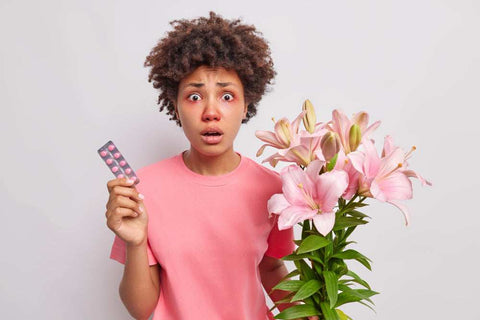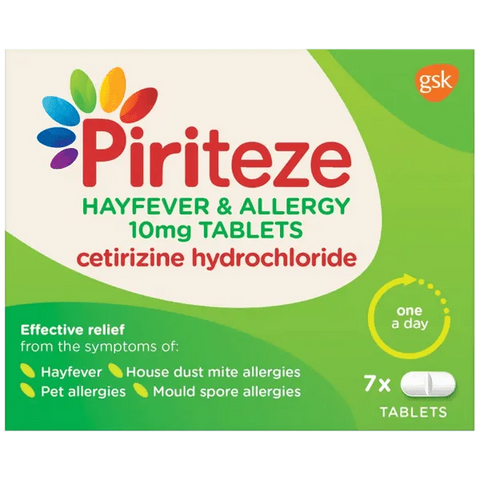Why is Hayfever Worse at Night?


Hayfever, medically known as allergic rhinitis, plagues many individuals with its constellation of uncomfortable symptoms. It's an allergic response to outdoor or indoor allergens, such as pollen, dust mites, or pet dander. This condition can cause a significant burden, not only due to its symptoms but also because of its perplexing tendency to worsen at night, which is a particularly distressing issue for sufferers.
Many individuals report that their hayfever symptoms intensify as night falls. It's a phenomenon that appears counterintuitive; after all, night-time suggests a retreat from the day's pollen-laden air. Yet, the nocturnal exacerbation of symptoms is a well-documented occurrence, affecting sleep quality and overall well-being.
The purpose of this article is to unravel the complex reasons behind the worsening of hayfever at night. Understanding why symptoms exacerbate under the cloak of darkness is crucial for those seeking relief. Additionally, this exploration can illuminate the significant impact of hayfever on sleep and, consequently, on the quality of life.

Hayfever symptoms, including nasal congestion, sneezing, itchy eyes, and a sore throat, create a tapestry of discomfort that can dominate one's life. Nasal congestion, in particular, can be extremely bothersome at night, leading to sleep disturbances and subsequent daytime fatigue.
The triggers of hayfever are diverse, ranging from pollen from various flora to indoor allergens like dust mites and pet dander. These triggers instigate an immune response that results in the symptoms that so many are familiar with.
Hayfever symptoms exhibit a diurnal pattern, ebbing and flowing over the course of 24 hours. The traditional understanding has been that symptoms peak during the day when pollen counts are highest. However, this does not align with the experiences of those who find nighttime to bring a crescendo of symptoms.
The circadian clock, the body's internal time-keeping system, orchestrates a symphony of bodily functions, including sleep, metabolism, and the immune response. Its influence extends to the realm of allergies, with hayfever symptoms being directly affected by these biological rhythms.
There's a notable variation in immune responses over a 24-hour period, governed by the circadian clock. Dr. Emma Hughes, an immunologist, notes, "The timing of cytokine release, which can influence allergic reactions, is often overlooked when considering hayfever symptoms." This circadian influence may help explain why symptoms can intensify at night.
Contrary to popular belief, certain pollen counts can actually rise in the evening. As the air cools, pollen that has risen during the day's heat can settle back to ground level, where it easily finds its way into homes and respiratory systems.
Indoor allergens such as dust mites thrive in the bedding where people spend hours each night. Moreover, pet dander can accumulate throughout the day, becoming another source of nighttime misery for hayfever sufferers.
At night, the reduced exchange of air in closed environments can lead to a concentration of allergens. The impact of humidity and temperature on air quality can also exacerbate hayfever symptoms during nocturnal hours, as pointed out by environmental health expert Dr. Lucas McCarthy.
The evening activities that precede bedtime can inadvertently increase exposure to allergens. For instance, an evening stroll may seem harmless but can bring a host of allergens into the home on clothes and hair.
Even the position in which one sleeps can affect the severity of hayfever symptoms, as lying down can promote nasal congestion. Furthermore, pre-sleep routines often ignore the invisible allergens that have been collected throughout the day, setting the stage for a night of heightened symptoms.
The stillness of night might bring respite to many, but for hayfever sufferers, it's often the time when their symptoms intensify. This worsening can, in part, be attributed to the hormonal ballet that orchestrates our sleep-wake cycles. Cortisol, which possesses anti-inflammatory properties, dips at night, which for hayfever sufferers means a decrease in the body's natural suppression of inflammatory responses.
Concurrently, melatonin levels rise to facilitate sleep, yet this hormone also plays a role in immune system modulation. Dr. Jennifer Ashton, a leading allergist, explains, "The nocturnal surge in melatonin can exacerbate allergic responses, making hayfever symptoms more pronounced." These hormonal fluctuations are a natural part of our circadian rhythm, but they unfortunately contribute to the nightly plight of those with hayfever.
The nasal cycle, a lesser-known yet normal physiological process, refers to the periodic congestion and decongestion of the nasal cavities, typically on an alternating basis. While usually unnoticeable, in those with hayfever, this cycle can become a pronounced and disruptive force. "Hayfever sufferers experience an intensification of the nasal cycle due to inflamed airways, leading to more severe congestion at night," states Dr. Harrison Blackwood, an ENT specialist. The impact of this cycle is exacerbated by the prone position of the body during sleep, contributing to the congestion that plagues hayfever sufferers throughout the night.

Navigating the myriad of hayfever treatments can be overwhelming, but understanding the role of timing, especially for medications, is crucial. Antihistamines, the frontline defence for many, are more effective when taken regularly due to their preventive action on histamine release. Dr. Ashton advises, "Timing your antihistamine intake for the early evening can preempt the nocturnal onset of symptoms." Nasal corticosteroids are another cornerstone of hayfever management, known for their potent anti-inflammatory effects. They work best when used consistently and may take several days to reach their full potential.
Medications for hayfever include:
For more visit Welzo's Allergy Medication.
The battleground against hayfever extends to the domestic environment. Employing allergen-proof bedding can act as a barrier between the sufferer and common triggers like dust mites. "Using allergen-impermeable covers can significantly reduce exposure to dust mites," suggests Dr. Blackwood. Air purifiers with HEPA filters can also remove a significant amount of pollen and spores from indoor air, with Dr. Ashton noting, "Maintaining clean air inside homes is essential for managing hayfever, especially at night when symptoms can worsen."
Simple lifestyle modifications can have a profound impact on the severity of hayfever symptoms at night. Showering before bed to remove pollen from the skin and hair, and keeping windows closed to prevent the ingress of nocturnal pollen and spores are strategies that are often recommended. "Adopting these habits can reduce the nighttime allergy burden," says Dr. Ashton.
"Indoor allergens like dust mites or pet dander can be just as provocative as outdoor pollen," says Dr. Ashton, highlighting the importance of environmental control in managing symptoms.
Reflecting on the myriad of factors contributing to the nocturnal exacerbation of hayfever, it's evident that the interplay between circadian rhythms, immune function, environmental elements, and lifestyle habits constructs a complex tapestry that underpins this condition.
Strategising the management of nighttime symptoms is not merely about comfort but is intrinsic to our overall health. Quality sleep is pivotal to a myriad of health outcomes, and uninterrupted rest is a pillar of wellbeing for hayfever sufferers. Effective management plans can mitigate the impact of hayfever, restoring the sanctity of sleep and enhancing life quality.
As research delves deeper into the circadian influences on allergy symptoms, there is hope for more tailored treatment protocols that align with our biological rhythms. "Ongoing studies into circadian biology will undoubtedly offer innovative strategies to combat hayfever," anticipates Dr. Ashton.
Plus get the inside scoop on our latest content and updates in our monthly newsletter.